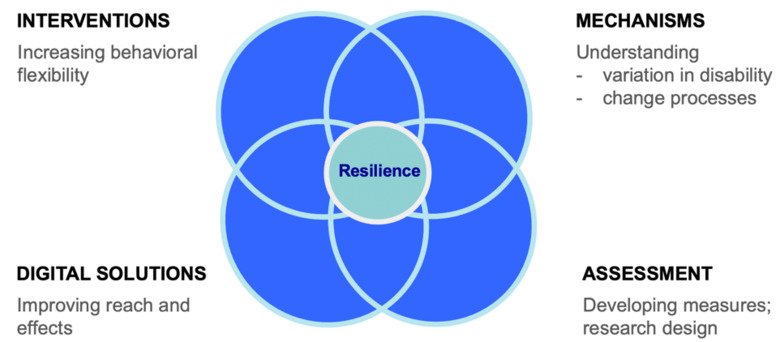
The research group consists of research assistants, PhD students, postdoctoral researchers, and senior researchers. Projects include studies on treatment-evaluations specifically targeting individuals living with chronic pain, the psychosocial work environment and its effects on health and well-being of workers, insomnia in chronic pain, inflammatory biomarkers in chronic pain, and neuropsychiatric comorbidity in paediatric chronic pain.
In our work, we utilise innovative digital solutions and collaborate with partners from other sectors, such as health care providers, technological developers, and (inter-)national academic institutes.
Behavioural treatment
Our research on behavioural treatment is centred around the individual’s resilience, with studies on the effects of interventions, mechanisms of importance for individual differences, assessment, and the utility of digital solutions.

Research program
Digital behavioural health treatment for chronic pain: the DAHLIA program
About 20% of the population live with chronic pain, and many of these individuals experience psychological distress and impaired daily functioning. Medical treatment alone is often insufficient and behavioural interventions are critical to improve resilience to chronic pain and distress. However, more research is needed to develop individualized treatment that matches personal needs. Furthermore, evidence-based behavioural treatment is currently unavailable to many patients and digital solutions are of utmost importance to improve access to interventions that may improve resilience, functioning, and health.
Within this program, we focus on developing, evaluating, and implementing a Digital behAvioural Health treatment for individual with chronIc pAin ('the DAHLIA program’). It follows the ‘agile mHealth development and evaluation lifecycle’ (Wilson et al., 2016), combining scientific evaluation methods with iterative product development approach.
Research questions
- Is the DAHLIA treatment feasible and acceptable for patients with chronic pain and health care professionals?
- What are patients’ individual change processes when receiving the DAHLIA treatment?
- To what extent is the DAHLIA treatment clinically effective and does it show cost-effectiveness compared to treatment as usual?
- What are the determinants of successful implementation of the DAHLIA treatment into the Swedish health care system?
Study details
Digital behavioural health treatment: The process-based, behavioural health treatment will be built into the secure web-platform 1177, which is used across Sweden and adheres to General Data Protection Regulation (GDPR) requirements. Generally, the treatment aims to facilitate exposure in the process of developing ways to live well with chronic pain. It runs over 6 weeks and includes short digital self-guided sessions to improve patients’ ability to manage chronic pain and distress, a digital diary enhancing self-awareness, and a chat function for communication with health care professionals.
Development using focus groups: User-input early in the development process is key to enhance feasibility and relevance. Three focus groups will be conducted in 2021: two with chronic pain patients and one with health care providers (psychologists and psychotherapists). The focus groups will explore patients’ health needs as well as structure and content of the intervention.
Optimisation studies using the single case experimental design (SCED) method: Adopting an iterative approach, the 6-week treatment will be piloted in small cohorts comprising 10 patients and their treating health care professionals (sprints). User-input will be integrated and tested in the following sprint, resulting in 4-6 optimisation studies. This stepwise approach will guide the development of a feasible and acceptable treatment and allows for analyses of individual change processes using a SCED approach with digital diary data.
Clinical trial: A two-armed randomised controlled trial (RCT) enhanced by SCED methods, with a 3- and 6-month follow-up will be conducted, to test the clinical effectiveness and cost-effectiveness of the treatment compared to treatment as usual. Examples of outcome measures include psychological (in-)flexibility, pain interference, work ability, and sick leave.
Implementation: At baseline and after the RCT, interviews with stakeholders will be conducted to identify barriers and facilitators of implementing the treatment into routine health care. Stakeholders include the development team at 1177, health care professionals, health care managers, and municipality representatives. A business model canvas will be used to facilitate the implementation process.
DAHLIA collaborators and advisors
- Prof. Lance McCracken (Uppsala University)
- Prof. Katja Boersma (Örebro University)
- Dr. Ida Flink (Örebro University)
- Dr. Suzanne Petersson (Linnaeus University & Region Kalmar County)
- Dr. Hannah Christie (Maastricht University)
- Dr. Inna Feldman (Uppsala University)
- Dr. Evalill Nilsson (Linnaeus University)
- Prof. Johan Vlaeyen (KU Leuven)
Research grants
AFA Insurance (AFA Försäkring)
The Scientific Research Council (Vetenskapsrådet)
ALF project grant, provided by the Regional agreement on medical training and clinical research between Stockholm City Council and Karolinska Institutet
Key references
Bartels, S et al., Development, evaluation, and implementation of a Digital behavioural health treatment for individuals with chronic pain (the DAHLIA project): A study protocol (in preparation).
Gentili, C., Zetterqvist, V., Rickardsson, J., Holmström, L., Simons, L. E., & Wicksell, R. K. (2020). ACTsmart–Development and feasibility of digital Acceptance and Commitment Therapy for adults with chronic pain. NPJ digital medicine, 3(1), 1-12.
Rickardsson J, Gentili C, Holmström L, Zetterqvist V, Andersson E, Persson J, Lekander M, Ljótsson B, Wicksell RK. Internet-delivered acceptance and commitment therapy as microlearning for chronic pain: A randomized controlled trial with 1-year follow-up. Eur J Pain. 2021 Jan 18. doi: 10.1002/ejp.1723. Epub ahead of print. PMID: 33460240.
Zetterqvist V, Gentili C, Rickardsson J, Sörensen I, Wicksell RK. Internet-Delivered Acceptance and Commitment Therapy for Adolescents with Chronic Pain and Their Parents: A Nonrandomized Pilot Trial. J Pediatr Psychol. 2020 Oct 1;45(9):990-1004. doi: 10.1093/jpepsy/jsaa060. PMID: 32974656.
Wicksell, R. (2014). Att leva med smärta-ACT som livsstrategi. Natur & Kultur.
Collaboration with the Behavioral Informatics Team
We collaborate with the Behavioral Informatics Team from the Department of Learning, Informatics, Management and Ethics (LIME) due to a joint interest in effective and accessible behavioural interventions, as well as ways to gather and analyse behavioural data through intensive longitudinal data collection (e.g., diary methods, experience sampling methods, and single case experimental designs). Projects led by the Behavioral Informatics Team focus on work-related stress and well-being of health care workers, during the COVID-19 pandemic and beyond. Read more here.
